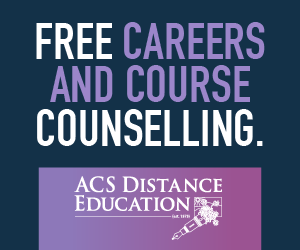 Course Content
Course Content
To gain a Certificate in Careers Counselling, you need to complete six hour modules. There are three core modules and three elective modules as follows -
 Core Modules
Core Modules You must complete all three core modules
Life Coaching
Elective Modules
You will be required to choose three modules from the list below -
What Are the Advantages of Studying Careers Counselling with ACS Distance Education?
- You can start at any time to suit you.
- The courses are self-paced.
- You can study when and where suits you. They are flexible to fit in around you and your lifestyle.
- It is not just a course, it is a package of learning that includes – course notes, tutor feedback, self-assessment tests, research tasks and assignments.
- Our tutors are all experts in their field, with years of experience in psychology and counselling.
- They are also keen and enthusiastic about their subject and enjoy working with students to improve their knowledge and skills.
- Courses are also updated regularly to meet the demands of the changing needs for knowledge and to keep our courses up to date.
What Next?
Do you want to be a Career Counsellor?
Career Counselling is much more than just finding people work.
Among other things, Careers Counselling may involve helping people:
- discover their goals and motivations
- connect with their values, and what job satisfaction means to them
- identify the best job for their skills and interests
- determine their strengths and weaknesses, identifying areas where they may require development
- discuss their financial situation to help find solutions
- find a better or more appropriate job for their situation
- achieve job satisfaction through appropriate choices
- plan and cope with career changes
- better adapt to the workplace
- improve their potential for advancement in the workplace
- identify new career possibilities when circumstances change.
Career counselling provides you with many different opportunities. You may wish to specialise with a particular demographic, for example University students, people re-entering the workforce, people going wanting to change career, high level corporate people looking for a more meaningful career... the list is endless - the important question here is, where do your interests lie?
Potential job opportunities:
- Work for yourself
- Use your skills in an HR position
- Work in an employment agency
- Work for an education facility
- Become a consultant for large organisations
You can enrol today by clicking the “Enrol Now” button above.
Or
Click here to Contact a Psychology Tutor.
Or Request a Prospectus Here.